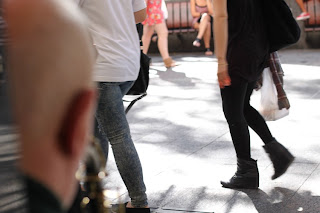Another deep look at a very interesting topic of journalism - investigative journalism. Investigative journalism has a very crucial role to the news industry, because it acts as a medium to discover truth, to discover things people wouldn't normally know or see. We get to see the facts and opinions inside a certain topic or story, and we can identity lapses between media. One thing to point out though is that investigative journalism is distinctive from police investigation.
Bruce introduced us 5 "IN"s of investigative journalism:
- Intelligent: something that is well thought out, and how it fits into sinister things
- Informed: journalist is briefed on the facts, otherwise it will be missing out the story
- Intuitive: having a fresh mind
- Inside (intimate): something like a real story behind average media coverage, and sometimes getting into people's lives
- Invest: being an investigative journalist, you have to invest yourself into there, the whole scope, but still need to draw the line between good and bad moral values
Investigative journalism is a deep subject, and there are quite a few deeper meanings behind this name.
- Critical/Thorough: Journalists have to be an active participant of the investigation, the key idea of this is to have active intervention to a topic, and put in substantial effort to it
- Custodians of conscience: The investigation has to meet up to the society's moral view and give exposure to something bad, and let the public to observe and examine the issue
- To provide a voice for people without them: Public interest is the main objective and we need to give power for the powerless, and voice for the voiceless
- Watchdog/4th branch of the government: Looking at the doings of a government and ensure free flows of information that is needed for a democracy, the role of a function of democracy is important to interrogate judiciary, executive and legislature
An investigative journalist has to be like a "shoe leather", and standing back to see the big picture of the whole issue, and most importantly, take nothing for granted. Be always sceptical and do not believe in everything you see.
John Pilger, an Australian investigative journalist has a very nice sum-up for it: "It's not enough for journalists to see themselves as mere messengers without understanding the hidden agendas of the message and myths that surround it."
Interestingly, investigative journalism not only exist in the past as well, but they have done tremendously great deed to the society. It's like a trailblazers that leads us to the modern method of investigative journalism.
Several men throughout the history, like Edward Smith Hall, W.T. Stead, Bob Woodward, and surprisingly, Julian Assange has given breakthroughs towards the society. It is not like they have completely change the course of history, but major adjustments to the society like law change for the Age of Consent are made because of investigative journalism. And they helped uncovered some never-before seen and known facts and truth about the world, like what Wikileaks does to uncover the inner workings of governments.
Nowadays, we tend to do investigative journalism in a much more subtle, localised way. ABC's Australian Story is a prime example of this, the programme leads the audience to the daily lives of a normal person, and give us insights about something we might have overlooked.
However, we aren't always exactly sure about what we investigate. But there's an old journalism saying, "If your mother says she loves you, check it out." That means we have to check all the facts, assume absolutely nothing, and of course, don't trust whistleblowers as they might be misleading and sometimes, crazy even.
So, with all these knowledge we just learnt, how about something practical that we can apply to our jobs? There are several methods that are mentioned in the lecture, on different types of investigation interaction. Some of them are holding at a high moral standards, but some are just the opposite:
- Interview
- Observation
- Analysing documents
- Briefings
- Leaks
- Trespass
- Theft
However, with the advent of technology recently, we seemed to take Wikipedia and Google for granted. Easy, convenient access to information we need. However, this is of course not the case prior to their existence. Again, this goes back to the "not taking anything for granted".
So, what are the threats investigative journalism is facing?
One of them is being Online News. Because there are less money involved in the online news business, that means news companies may not be able to employ a lot of journalists, making less news and having less time, resulting in a lesser investigative journalism.
The other thing we fear is the "Public Relationship" field. PR is all about bonding the public with the clients and in this case, government or corporations. They provide selective facts just to give the public a persuasive image of themselves, putting all truths behind the bars. This is exactly the opposite we journalists would like to see. If PR continues to grow, we would result in a shrinkage of quality journalism. No exposure, dodging questions, massaging "talent", and cleaning up stories leave us no way to intervene and investigate. They are literally our "cause of death" in quality journalism.
But will the future of social media and paywall save us from all these nasty things? Probably, as I've said this several times before in the lecture blog entries, the audience is the most important part because if they prefer crap news and crap investigations, we can't help but falling into the culprit of horrible journalism. But if our audience wanted to be a well-informed, critical, and open-minded bunch of scholars, they can change the whole story.
D.













